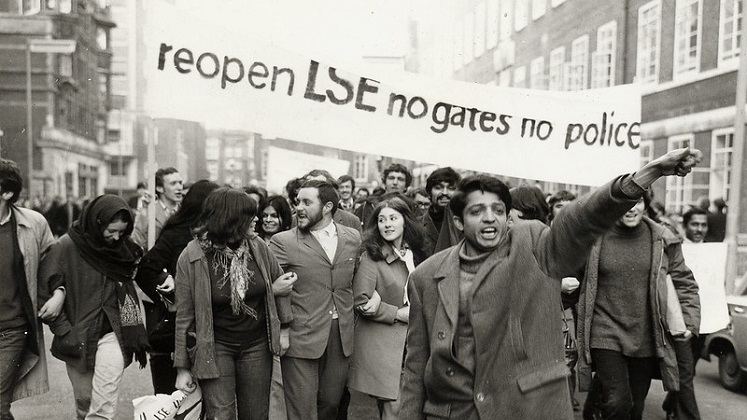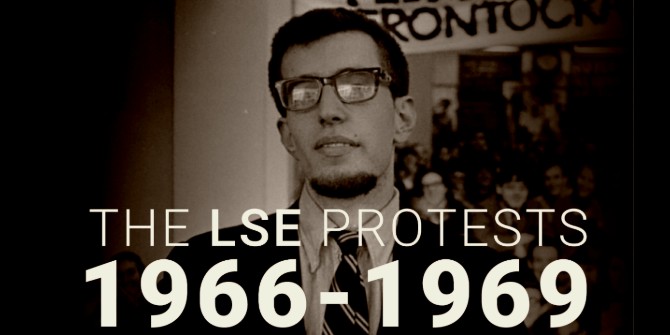Lessons on Revolution is a play about the LSE student protests of the late 1960s, written and performed by Undone Theatre and Carmen Collective. They worked with Chelsea Collison, LSE Library Learning and Engagement Officer to visit the LSE Archives and used what they found to help devise the play. Here, Samuel Rees and Gabriele Uboldi from Undone tell us more about creating the play, their experience of using the archives, and their upcoming show at the Edinburgh Fringe.
Imagine you’re sitting in a theatre in North London. A mustard carpet covers the stage; two performers serve tea and biscuits while an old song plays on a record player. For a moment you wonder: What does all of this have to do with LSE? Then, the performance begins. The actors circle around an old-style overhead projector and show you a black-and-white picture of a young woman being carried away by two police officers; Fleet Street busy with protestors holding banners; students sleeping amongst blankets in a university room. The performers piece together fragments from the LSE archives to reconstruct the story of how, over fifty years ago, radical students occupied the London School of Economics. Slowly, the documents, photographs, and newspaper cut-outs from the archives come to life through the medium of performance.

We are Sam and Gabs, the performers in question. We visited the LSE archives just a few months before the performance you’re watching. At that point, Lessons on Revolution had been an idea in our heads for over two years. It began with the frustration of our own situation, sharing a flat in Camden which was unfit to live in, working multiple jobs to make ends meet, and seeing the world around us offer little chance for hope. We wondered how the generations before us had dealt with the idea of radical change.
That’s when we stumbled upon the radical history of 1968. Our first inspiration was a book. Voices of 1968: Documents from the Global North describes itself as “a vivid collection of original texts from the movements of the long 1968”. That year, people across the world erupted into protest, from anti-war marches in Japan to striking workers in Italy. Voices of 1968 details how, in England, students occupied the London School of Economics in protest to the university’s connection to apartheid regimes in Africa. This was all happening a stone’s-throw from where we were living. Surely there was the potential of an idea in all of this?

So, we contacted the LSE Library. We were immediately met with enthusiastic invitations to come visit. Barely knowing what we were even writing about yet, we gratefully accepted the offer. The archive at LSE contains a wealth of materials about what happened that year. Every document has a different tone and feel; some are long, thorough pieces of writing which give day-by-day accounts of the protest, others are seemingly random, out-of-context photographs, snapshots of a time and place.
We aren’t historians. This means that not only are we not trained to do historical research, but also that we have no idea how to handle archives. When we sift through the documents, we slowly realise with growing dread that we’ve not been keeping track of the ordering and have messed up the delicately composed compendium of resources. For a moment, we give each other a look which seems to say, “shall we just…not tell them?”. We realise eventually that this would be the height of rudeness and so, like two schoolchildren, we limply offer our apologies to the clerk at the desk, who is nothing other than delightful about it. We probably deserved a slap on the wrist for that.

During 1968, LSE’s Socialist Society released a special edition of their newspaper Agitator, detailing the corruption and complicity that the School’s new Director was embroiled in. We knew from our initial reading that if we could find this document in the archive then it would be a trump card for our research. When it pitched up, with a hand-drawn cover and hastily smashed-out prose inside, it was everything we could have hoped for. The writing is at an angle to the page, as if the typewriter used wasn’t aligned with the paper. The staples binding it together are starting to come out. It feels as if it might fall apart in our hands, and, with it, all of our fragile understanding of 1968.
Not every experience at the archive was a victory. As theatre makers, we’re not here to compose an objective and sober account of events, we’re here to tell a story. We entered the library on that day with an agenda—we knew what we wanted the show to be about, and what we wanted the archive to say. But the archive misbehaved, it didn’t give us what we needed. We realised that there was no grand narrative here. The revolution didn’t happen, the revolutionaries packed up at the end and went home. This was a show about failure. But it was also a show about what is born in moments of struggle and what new futures can be imagined. So, what possibilities survive beyond the revolution? What is preserved in the archive?

This was where Lessons on Revolution came from. It’s an attempt to bring history alive through performance and to think about the future as a site of contestation, in which there is still hope so long as we come together to imagine.
Imagine you’re back in the theatre, with the mustard carpet, the overhead projector, and documents spread all over the stage. In the dark, you slowly become aware of the people around you—sitting together becomes a political act. During the show, we invite the audience to read out parts of the show, and to take ownership of the story themselves. For us, this is about returning agency; the archive is not a rarefied, off-limits relic of history, it’s alive, it’s being created all around us, and we’re part of it.

The response was overwhelming. Our initial run received glowing reviews and a transfer to Soho Theatre. Multi-Olivier award winning playwright James Graham came to see the show and called it a “compelling and galvanising” piece of theatre. Back when we visited the LSE archives, when we felt lost and like we couldn’t find what we were looking for, we had never dreamt that any of this could happen. We’ve been so lucky to share this story with so many spectators, and we’re thrilled that Lessons on Revolution will be running for the entire Edinburgh Fringe this August at Summerhall—we’d love to invite you to bring 1968 to life with us.
The documents we examined at LSE are a powerful tool for showing us a way forward. In a certain time and place, a group of people came together united by a common goal, and they recorded that moment. Our show is another recording, another addition to the archive. In the midst of a revolution that may never come, Lessons On Revolution says: we were here.

LESSONS ON REVOLUTION
by Samuel Rees and Gabriele Uboldi
“Compelling and galvanising” – James Graham
SUMMERHALL – Former Women’s Locker Room
1-26 August, 2:15pm (not on 12 & 19)
https://festival24.summerhall.co.uk/events/lessons-on-revolution/





